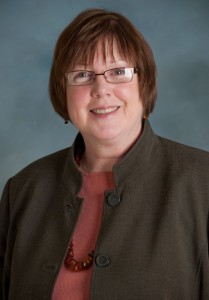CSUN Dean Elected President of National Arts and Sciences Council

Elizabeth Say
Elizabeth Say, dean of California State University, Northridge’s College of Humanities, has been elected president of the Council of Colleges of Arts and Sciences.
Say, who is currently president-elect of the organization, will take her place as head of the council in November. The Council of Colleges of Arts and Sciences is a national association of deans of colleges of arts and sciences whose purpose is to sustain the arts and sciences as a leading influence in American higher education.
“It’s an honor to be elected to lead such an important body,” Say said. “I am, and the council is, firmly committed to the principle that liberal arts and sciences are the foundation of democracy. If we don’t have citizens who can think, read and write critically and understand the critical issues and global implications of a changing society, then we don’t have a future.
“The humanities and liberal arts provide the lifelong learning skills that are necessary for people to succeed, and for us to succeed as a nation,” she said.
An alumna of the university, Say received her bachelor’s of arts degrees in English and religious studies in 1981. She has a doctorate in religious social ethics from the University of Southern California.
She returned to CSUN in 1989 as a faculty member in the Department of Religious Studies. She is the founding chair of CSUN’s Department of Women’s Studies and served as associate dean of the College of Humanities before being named dean in 2004. Her research and publications are in the areas of women and religion, and gay and lesbian studies.
The Council of Colleges of Arts and Sciences, which is celebrating its 50th anniversary this year, serves as a forum for the exchange of ideas and information among deans of arts and sciences representing member colleges and as a representative of the liberal arts and sciences at a national policy-making level. It seeks to support programs and activities to improve the intellectual stature and public understanding of the disciplines of the arts and sciences.
Arts and sciences colleges represent more than half of the undergraduate instruction offered at their institutions, and many member colleges are responsible for a wide spectrum of master’s and doctoral degree programs. The council’s member institutions represent the largest component of American higher education in publicly and privately supported universities and colleges.
With eight academic departments and seven interdisciplinary programs, CSUN’s College of Humanities is the most diverse college at the university. The college comprises disciplines that traditionally make up the study of humanities — including philosophy, English and modern and classical languages — while also housing one of the oldest and largest Chicana/o studies department in the United States and the only Central American studies program in the country. Also core to the college is a Liberal Studies Program that puts CSUN among the top three institutions in California in preparing K-6 educators for the classroom. Among the college’s newest programs are minors in Middle Eastern and Islamic studies and queer studies. In all, the college offers students more than 40 major, minor and graduate degree paths, with many potential options for specialization.

 experience
experience